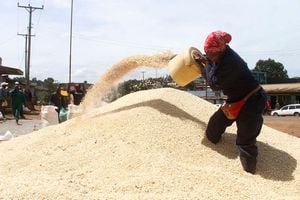
Customers shop for subsidized maize flour at a Naivas Supermarket.
Ugali lovers are set for easy servings ahead as maize prices nose-dive due to harvest of this season’s crop and arrival of cheap produce from East Africa Community (EAC) member states.
Consumers are emerging as main beneficiaries of the drastic decline in prices from Sh4,600 to Sh2,200 per 90-kilogram bag in parts of the North Rift region as farmers who were hoarding last season’s produce release the commodity to the market to avert losses.
Maize flour prices have declined from Sh180 to Sh120 per two-kilogramme packets and the prices are expected to reduce further following the arrival of cheap produce.
It is panic selling for maize farmers who have been hoarding the produce in the North Rift region in anticipation of better prices as they rush to sell the crop to avoid losses.
“We expected the prices to improve to enable us earn profit but the market forces of supply and demand has seen the prices plummeted to almost below Sh2,000 translating to massive losses” said David Kosgei from Ziwa, Uasin Gishu county.
Millers interviewed by the Nation on Sunday said the entry of maize from Tanzania and Uganda has contributed to the lowing the cost of the stable in the local market.
Tanzania is the major exporter of maize and rice to Kenya and other East and countries, including eastern Congo DRC, Burundi and South Sudan.
“The maize prices are expected to plummet further due to harvest of short term crops-potatoes, beans among other alternative food crops to maize,” said Joshua Kosgei, an Eldoret based miller.
This comes as Agriculture Cabinet Secretary Dr Andrew Karanja discloses that the country projects to harvest 70 million bags of maize up from 46 million bags last season which will translate to further drop in maize prices to the relief of consumers.
“We anticipate to realize 70 million bags of maize as compared to between 40 to 60 million bags last season signaling a major boost to attaining food security,” said Dr Karanja last Friday in Kitale, Trans -Nzoia county while attributing the high yield to distribution of government subsidized fertilizer and favourable climatic conditions.
The country’s annual maize requirement stands at 52 million bags-human consumption, manufacture of livestock feeds, seed multiplication and the manufacture of other products.
Dr Karanja disclosed plans by the government to support the Agricultural Development Corporation (ADC) and Kenya Seed Company (KSC) in enhancing seed multiplication to meet increasing demand in the market.
“These two agricultural institutions play key role in propel crop production and enabling the country to attain food security,” said Dr Karanja.
Maize prices have reduced from Sh5,200 to Sh3,400 in Kisumu and Sh3,200 in Nakuru due to increased supply of the produce in the market and harvest of alternative food crops.
“The maize prices are expected to decline further following the harvest of the crop in Western Kenya region, arrival of cheap produce from EAC member states and availability of alternative food crops,” said Joshua Too, from Moiben, Uasin Gishu County.
The Kenya Kwanza administration has pledged to put in place measures that will ensure the country does not import maize by 2025.
The country import food worth Sh500 billion annually but the President William Ruto has pledged to prioritize agriculture and help farmers increase productivity to cut down on the imports.
Maize imports from Uganda increased from 2,629 tonnes to 34,590 tonnes in the 2022/2023 marketing year while imports from Zambia increased from 10,728 to 88,050 tonnes in the same period.
The imports from South Africa increased from 2,782 to 64,512 tonnes but the imports from Tanzania declined from 708,978 to 412,755 tonnes due to export constraints.
The millers want the government to harmonize standards for cess and levies across the counties to facilitate steady flow of maize to sustain operations.
According to the Kenya National Bureau of Statistics, Kenya has imported an average of 295,092 tonnes of maize annually over the past five years.









